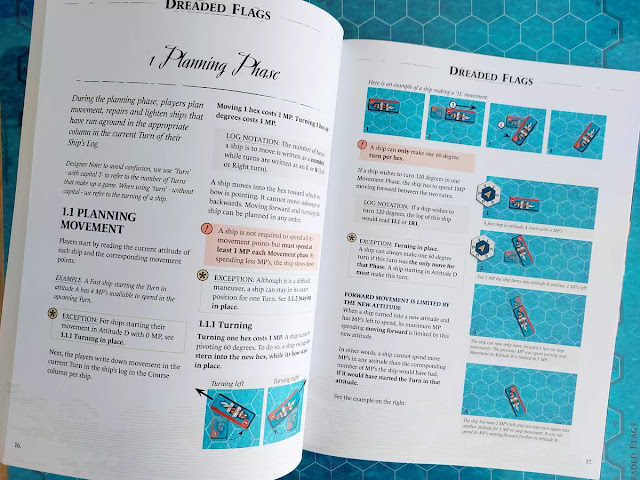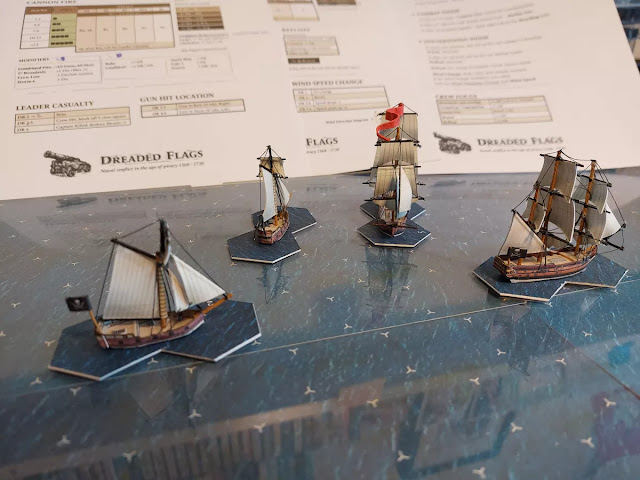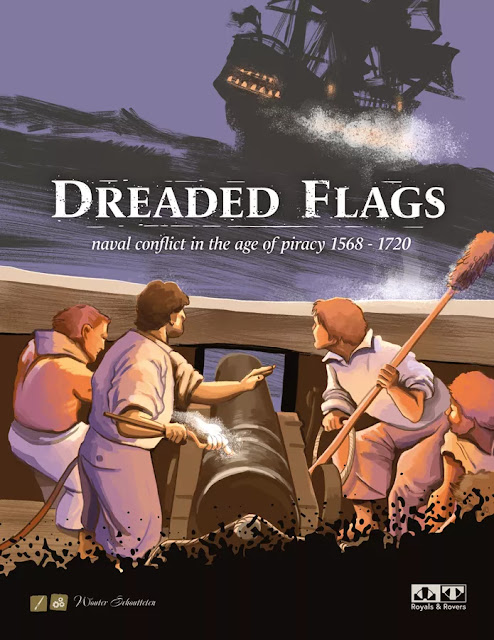Wouter Schoutteten on his upcoming game 'Dreaded Flags'
Naval Conflict in the Age of Piracy 1568-1720
This is look into Wouter Schoutteten's new, and first, game Dreaded Flags. Everyone, please practice your Arrgghhs.
Dreaded Flags is a game for 1 - 3 players about historical naval conflicts between small fleets in the Age of Piracy. It's a hex-and-counter wargame of medium-light complexity, with playtime ranging between 30min and about 2 hours and available as a gamebook.
It is my first release and hence my first (very instructive and enjoyable) experience with game design!
Robert asked me to write something about the game and since this piece goes together with a review, I like to give you an inside look into the development process.
Much of what we (think we) know about pirates, stories with protagonists like Blackbeard, is highly romanticized. Many of those stories can be traced to Charles Johnson's collection of stories (fact or fiction?), A General History of Pyrates. Nonetheless, when we look at the facts behind the legend, a fascinating story persists. These freebooters did manage to hijack ships or steal goods. How did they do it, with a small - often outdated - ship, only a few cannons and a very small crew?
 |
| Rulebook |
The few alliances we know of did not last (as we see between Bonnet and Blackbeard, and Every and Pharo, all featured in the game). Sea battles were deadly dangerous and the gains often unpredictable. A captain had to earn the trust of his men, and had to be able to maintain it in chaotic combat. And then there is the trick of just also being an agile, technical captain who can skillfully steer his ship and keep it on course. My first goal for the game was to make a realistic game in the setting of the age of piracy.
In addition, I also made an amazing observation. Just about all games about the age of piracy lose themselves in the romanticized, mysterious portrait of pirates. A historical simulation - or wargame - based on the facts at hand, is almost impossible to find. And the few I did find are outdated, cumbersome and/or out of print. That brings me to my second goal Dreaded Flags should also be a fun, playable game in addition to its historical depth.
 |
| The Counters are on the Back Page of the Rulebook |
Playable for me meant that the game should not take hours. One of the mechanisms that slow down play is when the main action or narrative has to be interrupted to do some bookkeeping or when dice have to be rolled again (e.g. if a player rolls an X, roll again to see what happens).
I wanted as much info as possible to already be hardwired into the game, before any dice are rolled. I believe we have succeeded in that, and it’s the strongest point in the gameplay, if you ask me. Some modifiers provide more or less dice, while others manipulate the value of the dice. Factors such as number of guns, distance, morale, wind speed...all are contained in one small table. Players roll a number of dice once for their cannon fire and immediately read the result. And with the addition of 2 colored dice for the optional hit table we increase the realism (and the agency of the players because with this rule they can aim at either hull or rigging). This way, Cannon fire and combat is very fast and yet yields incredible detailed results. To interrupt the action as little as possible, most bookkeeping and extra checks happen after the main action.
 |
| Some Action from a Test Game |
Another way we want to make the game accessible and playable is by avoiding jargon (and probably naval wargame fanatics will raise their eyebrows here!). But new players can't tell terms like backing, aft or port. And because there is already so much info for new players, we have left out any jargon as much as possible. This way gameplay is more intuitive and easier to understand for novice naval wargames. To preserve some of the atmosphere, the well-known terms bow and tern have remained. But wind attitudes have been translated to a number, from 1 to 6. We speak of small fleets - not flotilla, and so on.
Playable for me also means replayability. And that means versatility. In the choice of scenarios we have taken this into account. There are 2 completely solitary scenarios in it, while other scenarios are perfect with 2 players. There is 1 scenario for 3 players. Some scenarios are short and can be played in 30 min, others are longer but can also be played in 1 evening. Something for everyone. Another nice extra, I think, is that besides the 8 scenarios, players can easily create their own scenario. In the book are blank log pages with which they can work out their own duel. The system is perfectly scalable to play with even more players as well ( I think 8 players is a bit the maximum for practical reasons) Also, the standardized map makes working out scenarios easier.
Developing a game from A to Z is an incredible experience. But as a rookie, I still have a lot to learn. I am incredibly grateful to my test players and proof readers. It never ceases to amaze me that people want to take the trouble and time to test a game that may turn out to be rubbish. Or to pick out spelling errors from a text not written by a native English speaker! But it is indeed the passion, knowledge and willingness to help that makes our niche so wonderful.
One of the things I had the hardest time with was deciding which input from the test players to respond to and which not to. In doing so, I tried to go back to my original goal: a fairly fast-playing, accessible game of medium complexity with the necessary historical depth and realism. Balancing realism with playability became a real obsession.
 |
| You can also use Miniatures to play |
For example, I was satisfied with how hits translated into damage. You always have to consult and execute the hit table in a fixed order. This yields predictable damage results. One test player found that not realistic enough and upon request I developed the Advanced Hit Table. Since this adds another layer of complexity to the game, I decided to make this an optional game rule (again, pondering how complex game rules should be).... But I notice that I now always play Dreaded Flags with that optional rule, so maybe that should become a standard rule! So, putting my ego aside here, input from playtesters is very valuable.
I think making a complex game is easier than a simple but challenging game. So what to delete and what to keep? If you want the development process to keep moving forward smoothly, you have to be prepared to make choices quickly.
This whole process went pretty fast but that's what I had chosen. In a short period of time, this gave me a much better overall understanding of game development and what is involved. I hope Dreaded Flags finds a small, enthusiastic group of players. I am working on new games, and I hope the success of dreaded flags motivates me to continue working on them.
Thank you all for your support!
Wouter
Thank you Mr. Schoutteten for giving us a look at your new game.
These are some of the Battles:
The Trader (A learning Scenario) - 1716
The Ambush: John Hawkins vs. the City of San Juan de Ulúa - 1568
The Sacking: Henry Morgan vs the city of Maracaibo - 1669 (Solitaire)
The Heist: Henry Every vs. the Murghal Fleet - 1695
The Salvaging: Charles Vane and Henry Jennings vs. The Spanish Salvage Fleet - 1715
The Hunt: Frances Hume vs. John Martel - 1717
The Reckoning: Blackbeard vs. Stede Bonnet - 1718
The Menace: Black Bart vs. the people of Barbados - 1720 (Solitaire)
This is the Amazon page for the U.S.:



0 comments :